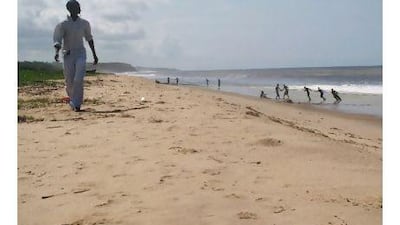We land in Angola in mud so thick the boat can't make it to shore. We've just crossed the mouth of the Congo River, from the south-western corner of the Democratic Republic of the Congo to the northern Angola port of Soyo, landing in water up to our calves with a clay bottom sticky enough to swallow our flip-flops whole. I sling my rucksack over my shoulder, yank up my trouser legs - unnecessary, really, since the crossing has already drenched us - and wade ashore barefoot.
The Soyo port is as other worldly as an alien landing site, with makeshift buildings whose purposes can only be guessed at. Oil tankers, normally attached to the backs of lorry cabs, rest on the ground, lined up, painted and numbered. Business is conducted in the interior of detached cargo containers.
"You are free to go now," says Manuel, the only immigration officers who speaks English, handing Roger back our passports.
Roger flips through his. "Where's the entry stamp?"
"You already have an entry stamp," Manuel says, pointing to a light impression left the day before by the border guards at the northern Angolan exclave of Cabinda.
"No, we need a new entry stamp. That's for Cabinda. We already left Cabinda."
"We cannot give you a second entry stamp. That is not possible," Manuel says.
"If the police stop us, we'll be in trouble," Roger says. "They'll say we're in the country illegally. We don't want any problems like that."
"There is no problem," he counters. "You may come into the country, but we are not permitted to give you another entry stamp. I am only telling you what my boss has told me."
This argument is costing us precious time, for we're already on the second day of a five-day transit visa. In three days, we need to be over the southern border with Namibia, 1,750km away. With only the vaguest inkling of local bus schedules, we don't even know if that's possible.
Yet Roger is correct. Police stops are commonplace in this part of Africa, and we expect an over-thorough inspection of our stamps and visas by officials searching for discrepancies. We need that entry stamp, so we take turns arguing. "As you can see, this is a double entry visa," I say. "So we should get two entry stamps, no?"
"Yes, and let me explain how it works. With a double entry visa, you get two stamps, one entry and one exit," Manuel says, with no evident attempt at humour. His logic does not seem watertight.
It's time to roll up our sleeves. "Manuel, let me put it this way," I say. "If I enter this room and then I leave the room, then I am no longer in the room. Correct?"
Manuel considers this. An argument breaks out in Portuguese among the immigration officials, and the others seem to be taking our side. I sense something about to give. Manuel sighs. "Would you like to discuss this directly with my boss?" he asks, making it sound like a threat.
"Yes, in fact."
Manuel gets the station chief on the phone and explains the situation. "He is coming," he says, hanging up.
The boss shows up roughly an hour later and looks at our passports. "You have already entered the country once on this visa," he says, using Manuel as a translator. "You cannot enter again." Wonderful.
"This visa allows two entries," I repeat, pointing to the number 2 written next to the field "number of entries." It's tough to argue with the number 2, so the boss just peers at it, then does a trick peculiar to a stumped immigration official: he flips through the passport, pausing at random pages to examine other countries' visas. The boss finally consents to giving us an entry stamp, provided we give money to one of his underlings to drive into town to make photocopies of our passports.
After a brief tussle with a customs official who demands a "service fee" for searching our luggage - we enlist Manuel to argue on our behalf, and win - we stumble out of the gates of the port into the streets of Soyo. It's late afternoon at this point. There are no buses heading south until tomorrow. We've only been in Angola a few hours, but it's already wearing us down.
But our luckiest break in this country comes just moments later, when we flag down a pick-up to take us to the bus station. The driver, José Luvumbu, teaches English at an energy company and goes out of his way to put us on our feet. The next three days in Angola are an adventure of non-stop movement, with ordinary Angolans like José aiding our passage through this maddening, oil-rich, expensive, war-torn country - but those stories will have to wait. Our concern now is to buy our bus tickets out of here and find an affordable room.
Scott MacMillan is blogging about his journey on his website, www.wanderingsavage.com.

